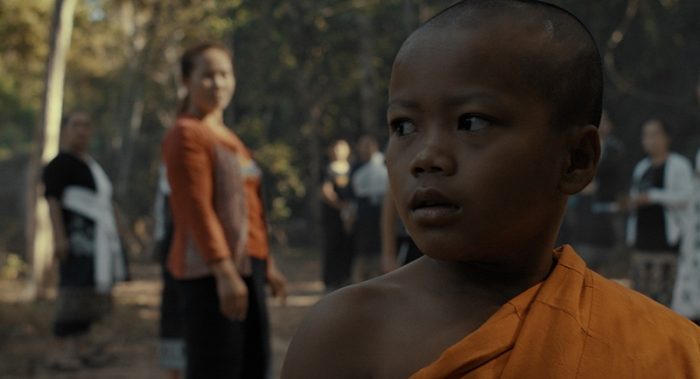
It’s no secret how collective audiences view cinema, any genre, as an escape. This leads to “Hollywoodized” representations of fantastical storybook livelihoods and blind eyes turned to inescapable hardships. Foreign filmmakers like Mattie Do aren’t beholden to such candy-coating at this year’s Fantastic Fest, which allows movies like The Long Walk to express more honesty and earnestness. Do stares death in the face and refuses to look away when ugliness or depression rears forward. Mortality is a blessing and a curse, which should be embraced on both fronts. Bless expressionism that tips the scale both ways, making for a haunting meditation on loss that’s blunt, bleak, and so much better for acknowledging – nay, waltzing step-for-step with – the darkness of finality.
In a small Laotian village, not far from modernization, exists a stretch of road where souls stroll freely. An old man (Yannawoutthi Chanthalungsy) is “gifted” the power to communicate with these spirits who’ve yet to pass onward, still restless. A young boy (Por Silatsa) finds a dying woman in the forest who eventually starts visiting in her ghostly form (no difference). Elsewhere, a local noodle purveyor goes missing and her daughter returns home for answers. How do all these stories intertwine? It’s death that always brings us together.
Narratively, The Long Walk puts a strenuous onus on viewers to interpret cohesion that’s not always available. It’s the kind of film that keeps you guessing, but not always intentionally. Clear distinctions between timeline splicing require more definition, despite answers being revealed come the third act. Reader, it’s not always easy to follow The Long Walk, and my admittance is acknowledgment. It’s a good thing Do speaks such a beautiful cinematic language throughout it all.
Do’s personal experiences during her mother’s death are translated to screen, as the young boy mentioned above watches his mother suffer from an incurable disease. Grief is such a strong affliction, and films often deal with what happens after – but Do confronts death’s inhumanity for all its discomfort. No shying away as the boy and “Old Man” become friends through their mutual bond of seeing “The Girl.” Together they confront the Grim Reaper’s touch, and together they experience nature’s due course. A child’s desperate tears, painful howls, and pleas that will not be answered are the film’s soundtrack aside from cicadas or crickets. Harrowing in their nonexistent closure.
“Wow, Matt. Why would I watch something so decidedly dark?” Because there’s so much to learn through how others process the unknown, and feeling something – anything – is a privilege.
Given the scenario above, we become entangled in a ghost story that’s never meant to outright scare. Apparitions appear just as humans would, in their fleshy state before dying. The old man collects souls buried in a personal graveyard to keep them at peace, but there’s always something more insidious to it all. Do manipulates tone and actions by playing the “mercy card” as “Old Man””speaks of putting those in need out of their misery, to be interpreted as “cruel” or “harsh” – yet inevitable. Once again dismal, but also poetic and burdensome as Matthew Macar’s cinematography captures these tortured shots of a vaping paranormal communicator sitting amidst tombstone lanterns and their ghastly owners circling the forest line.
Laotian representation helps set a stage for cultural eye-opening as this all takes place in a modernized world still vastly underdeveloped. Half-built cities loom in the distance as the old man’s community consists of wooden shacks and vegetable merchants. Lavender colored teas, herbal remedies, and clementine offerings to the deceased. The Long Walk has just as much to say about pressing onward as it does impoverished civilizations entering the 21st century overnight. Farmers who beg for a tractor but receive solar panels instead. In villages so ritualistic, there’s a deep connection to spirituality and faith – mainlined humanity without any complications that makes those more fortunate face hard truths about what’s otherwise easily ignored.
The Long Walk is many things, but what sticks with me is Mattie Do’s passionate dedication to emotional, raw-to-the-bone filmmaking. Minimal characters, maximum atmosphere, and vision that’s served like a warmed broth flavored without pretension. Cleaner continuity markings could go a long way (current format may lose some audiences), but those who appreciate cinema that languishes within our minds will in-turn appreciate Do’s open-hearted professions. A soulful standoff with debilitating sadness turned into a dreadful but necessary admission of fear and acceptance. Something I’ll too someday feel (again), with the comfort and reaffirmation that I’m not alone.
/Film Rating: 7 out of 10
The post ‘The Long Walk’ Stares Death in the Face and Refuses to Look Away [Fantastic Fest 2019] appeared first on /Film.
from /Film https://ift.tt/2maL1bM
via IFTTT
Comments
Post a Comment